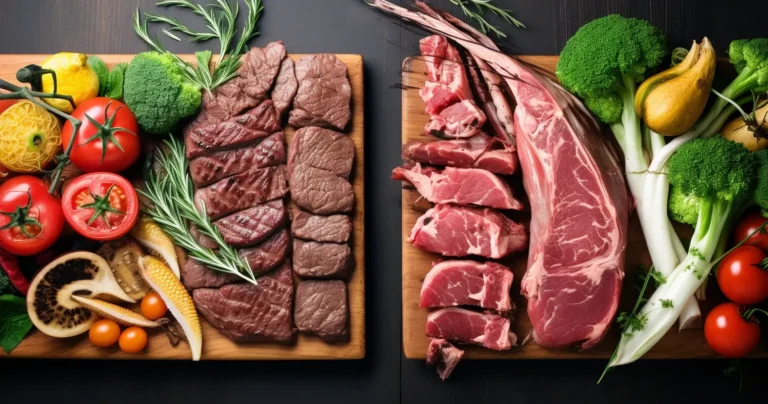When choosing the right diet, we often hear terms such as “low carb” or “ketogenic diet”. However, micronutrients are much more important for a healthy diet, but are usually ignored.
Meeting our micronutrient requirements is the key to a healthy diet in the long term. For this reason, in today’s article we clarify the question “what are micronutrients”.
I will summarize my key learnings from several years of reading so that you can integrate them into your life today.
What are micronutrients
In summary, micronutrients are minerals and vitamins that do not provide us with energy, but are essential for various physiological functions in the body.
Every micronutrient in detail:
Vitamins
Vitamins are organic compounds (=they contain carbon) that play a role in various metabolic processes in the body.
Water-soluble

Vitamin C, also known as ascorbic acid, fulfills a variety of important functions in the human body. One of its main tasks is to support the immune system by promoting the formation and activity of white blood cells.
In addition, it is also involved in the production of collagen, which is crucial for the skin, blood vessels, bones and cartilage and it acts as an antioxidant, protecting cells from harmful free radicals that can contribute to premature ageing and various diseases.
The best sources of vitamin C are citrus fruits such as oranges, grapufruits and lemons as well as kiwis and peppers.
B vitamins include B1 (thiamine), B2 (riboflavin), B3 (niacin), B5 (pantothenic acid), B6 (pyridoxine), B7 (biotin), B9 (folic acid) and B12 (cobalamin).
These play a crucial role in metabolism, support energy production and promote the function of the nervous system.
The best sources of B vitamins are wholegrain products, pulses, nuts, seeds, meat, fish, dairy products and dark green leafy vegetables.
Fat-soluble

Vitamin A is crucial for vision, the immune system and skin health. It supports the formation of rhodopsin, a visual pigment in the retina.
Good sources of vitamin A are animal products such as liver, eggs and dairy products.
Plant sources provide beta-carotene, which is converted to vitamin A in the body, and include carrots, sweet potatoes, spinach and mangoes.
Vitamin D is essential for the absorption of calcium and phosphorus and is essential for bone health. It supports the immune system and regulates calcium metabolism.
We absorb vitamin D primarily through sunlight. Food sources include oily fish such as salmon, egg yolk and fortified foods.
Vitamin K plays a central role in blood clotting and bone health. It supports the formation of proteins that are essential for blood clotting and promotes normal bone mineralization.
Good sources of vitamin K are green leafy vegetables such as spinach and kale, broccoli, chicken liver and fermented foods such as sauerkraut.
Vitamin E is a powerful antioxidant that protects cells from oxidative stress. It plays a role in skin health and strengthens the immune system.
Good food sources include nuts, seeds, vegetable oils, spinach and broccoli.
Minerals
Quantity elements

Calcium is crucial for strong bones and teeth, but also supports muscle contractions, blood clotting and nerve function.
Dairy products such as milk, yogurt and cheese are excellent sources of calcium. Green leafy vegetables, almonds and fortified foods also contribute to absorption.
Vegans should integrate fortified plant milks into their diet as an additional source of calcium.
Potassium plays a crucial role in regulating water balance, muscle contraction and maintaining healthy blood pressure.
Bananas, potatoes, oranges, spinach and beans are good sources of potassium.
Magnesium is an essential mineral that supports numerous functions in the body, including muscle contraction, energy production and bone health.
Nuts, seeds, whole grains, green leafy vegetables and legumes are rich in magnesium.
Sodium is a vital mineral that regulates fluid and electrolyte balance in the body. It plays a key role in maintaining blood pressure and nerve function.
The vast majority of people clearly exceed the recommended maximum amount of sodium. Processed convenience products in particular, such as deep-fried pizzas, contain high amounts and should be avoided if possible.
Trace elements

Iron is an essential mineral that plays a key role in the transportation of oxygen in the blood and is essential for energy production in the body.
Red meat, legumes, spinach, whole grains and nuts are excellent sources of iron.
Zinc is an important trace element that plays a crucial role in the immune system, wound healing and cell growth.
Meat, seafood, nuts, seeds and whole grains are good sources of zinc.
Copper is an essential trace element that is involved in various metabolic processes, including the formation of red blood cells and supporting the immune system.
Nuts, seeds, whole grains, legumes and offal are good sources of copper.
Selenium is an essential trace element with strong antioxidant properties that helps protect cells from damage.
Fish, meat, brazil nuts, seeds and whole grains are good sources of selenium.
Micronutrients and certain groups of people
Children and adolescents
During the growth phase, children and adolescents have an increased need for micronutrients. Particular attention should be paid to a balanced diet with plenty of fruit, vegetables, wholegrain products and dairy products (or other sources of calcium).
Pregnant and breastfeeding women
Pregnant and breastfeeding women need additional micronutrients, especially folic acid, iron and calcium. These nutrients are crucial for the development of the baby and the health of the mother.
However, nutrition during this phase of life should always be discussed with your doctor.
Athletes

Athletes should make sure they have an adequate intake of vitamins and minerals, as intense physical activity increases their requirements. Vitamin D for strong bones and magnesium to support muscle function are particularly important here.
Senior citizens:
Nutrient intake often decreases with age. Seniors should therefore pay more attention to a nutrient-rich diet in order to prevent deficiency symptoms. Vitamin D and calcium are particularly important for bone health.
Vegans
Vegans should take care to cover certain micronutrients such as vitamin B12, iron and zinc. Especially vitamin B12 is not found in plant-based foods and and must be urgently supplemented.
Conclusion
Now we have learned that micronutrients are far more than just letters and numbers on a nutritional table. The right balance of them is crucial for our physical condition.
And now that you know more about them, you can integrate them more consciously into your diet. This way, your body will remain an optimally functioning organism, ready for all of life’s challenges.
You may have noticed that although micronutrients play many roles in the body, they do not provide us with energy.
This (at least) equally important task is done by macronutrients, which you can find out more about in this article.
What is the difference between micronutrients and macronutrients.
Micronutrients are needed for numerous functions in the body, but do not provide us with energy. Macronutrients are needed in larger quantities, primary for energy production.
Why do we need micronutrients?
Micronutrients support metabolic processes, promote growth, strengthen the immune system and are essential for the health of cells and tissues.
Which foods are rich in micronutrients?
Different micronutrients can be found in different foods. In general, however, fruit, vegetables, wholegrain products, nuts and seeds are particularly rich in micronutrients.
What do vegans need to consider when providing micronutrients?
In a plant-based diet, particular focus must be placed on the supply of vitamin B12, iron, zinc and calcium.
Now, if you want to learn how you apply this new knowledge to create your personal healthy diet, you can read this article about the key principles about a healthy diet.
If you liked this article about “what are micronutrients”, I would really appreciate leaving me a comment about your personal oppinion.







